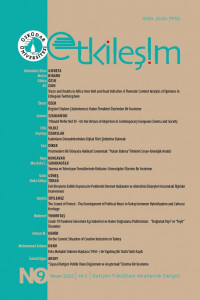Postmodern Bir Dünyada Hakikati Savunmak: “Yukarı Bakma” Filminin Sosyo-İdeolojik Analizi
Postmodernite, Gösteri Toplumu, Hakikat Sonrası, Sosyal İnşacılık, Yukarı Bakma (film).
Defending the Truth in a Postmodern World: Socio-Ideological Analysis of the Film “Don’t Look Up”
Postmodernity, Post-Truth, Social Constructivism, Don’t Look Up (film)., Society of the Spectacle,
___
- Alpay, Y. (2017). Yalanın Siyaseti. İstanbul: Destek Yayınları.
- Arnould, E. J., & Thompson, C. J. (2005, March 1). Consumer Culture Theory (CCT): Twenty Years of Research. Journal of Consumer Research, 31(4), 868-882. doi:https://doi.org/10.1086/426626
- Baudrillard, J. (1997). Tüketim Toplumu. (H. Deliceçaylı, & F. Keskin, Çev.) İstanbul: Ayrıntı.
- Baudrillard, J. (2009). Gösterge Ekonomi Politiği Hakkında Bir Eleştiri. (A. Bilginer, & O. Adanır, Çev.) İstanbul: Boğaziçi Üniversitesi Yayınları.
- Baudrillard, J. (2014). Simülakrlar ve Simülasyon (9. b.). (O. Adanır, Çev.) Ankara: Doğu Batı Yayınları.
- Bauman, Z. (1995). Çalışma, Tüketicilik ve Yeni Yoksullar. (Ü. Öktem, Çev.) İstanbul: Sarmal.
- Bauman, Z. (1997). Modernite ve Holocaust. İstanbul: Sarmal Yayınevi.
- Bauman, Z. (2005). Bireyselleşmiş Toplum. (Y. Alogan, Çev.) İstanbul: Ayrıntı Yayınları.
- Berger, P. L., & Luckmann, T. (1991). The Social Construction of Reality. New York: Penguin.
- Comte, A. (2001). Pozitif Felsefe Kursları. (E. Ataçay, Çev.) İstanbul: Sosyal.
- Çiğdem, A. (2001). Aydınlanma Düşüncesi. İstanbul: İletişim.
- Debord, G. (2016). Gösteri Toplumu (6. b.). (O. Taşkent, & A. Ekmekçi, Çev.) İstanbul: Ayrıntı.
- Durkheim, E. (1992). İntihar. (Ö. Ozankaya, Çev.) Ankara: İmge.
- Eagleton, T. (1996). İdeoloji. İstanbul: Ayrıntı.
- Kant, I. (2000). Aydınlanma Nedir? Sorusuna Yanıt. Toplumbilim Aydınlanma Özel Sayısı(11), 17-21.
- Keyes, R. (2004). Hakikat Sonrası Çağ. (D. Özçetin, Çev.) İzmir: Tudem Yayın Grubu.
- Kızılçelik, S. (1996). Postmodernizm Dedikleri. İzmir: Saray.
- Lyotard, J. F. (2013). Postmodern Durum. (İ. Birkan, Çev.) İstanbul: Bilgesu.
- Marx, K., & Engels, F. (2018). Alman İdeolojisi. İstanbul: Kor Kitap.
- Mcintyre, L. (2019). Hakikat Sonrası. İstanbul: Tellekt Yayınları.
- Oskay, Ü. (1982). Çağdaş Fantazya. İstanbul: Der Yayınları.
- Postman, N. (2004). Televizyon: Öldüren Eğlence. (O. Akınhay, Çev.) İstanbul: Ayrıntı.
- Schiller, H. (2018). Zihin Yönlendirenler. (C. Cerit, Çev.) İstanbul: Pınar Yayınları.
- Schumpeter, J. A. (1983). The Theory of Economy Development: An Inquiry into Profits, Capital, Credit, Interest and the Business Cycle. New Jersey: Transaction Publishers.
- Thomas, W. I., & Thomas, D. S. (1928). The child in America. Oxford: Knopf.
- Tönnies, F. (2019). Cemaat ve Cemiyet. İstanbul: Vakıfbank Kültür Yayınları.
- ISSN: 2636-7955
- Yayın Aralığı: Yılda 2 Sayı
- Başlangıç: 2018
- Yayıncı: Üsküdar Üniversitesi
Postmodern Bir Dünyada Hakikati Savunmak: “Yukarı Bakma” Filminin Sosyo-İdeolojik Analizi
Abdulaziz Dino GİDRETA, Mutlu BİNARK, Gökçe ÖZSU, Ali ZAİN
“Siyasal İletişim Politik Olanı Düşünmek ve Araştırmak” Üzerine Bir İnceleme
Melezleşme ve Kültürel Miras Arasında Türkiye'de Siyasal Müziğin Gelişimi
Sinema ve Televizyon Temsillerinde Reklamcı Stereotipleri Üzerine Bir İnceleme
Ayşe KONCAVAR, Mustafa C. SADAKAOĞLU
Eleştirel Söylem Çözümlemesi: Haber Örnekleri Üzerinden Bir İnceleme
‘Yapmamayı Tercih Ederim’ - Çağdaş Avrupa Sineması ve Toplumunda Alçalmanın Erdemleri Üzerine
